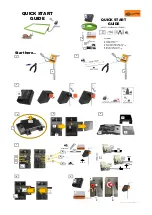
Important Safety Information: Instructions for Hose Routing
3
IMPORTANT SAFETY INFORMATION
Allow sufficient clearance from machine component operational zones such as:
• Drive shafts, universal joints and hitches (i.e. 3-point hitch)
• Pulleys, gears, sprockets
• Deflection and backlash of belts and chains
• Adjustment zones of adjustable brackets
• Changes of position in steering and suspension systems
• Moving linkages, cylinders, articulation joints, attachments
• Ground engaging components
For harness sections that move during machine operation:
• Allow sufficient length for free movement without interference to prevent: pulling, pinching, catching or
rubbing, especially in articulation and pivot points
• Clamp harnesses securely to force controlled movement to occur in the desired harness section
• Avoid sharp twisting or flexing of harnesses in short distances
• Connectors and splices should not be located in harness sections that move
Protect harnesses from:
• Foreign objects such as rocks that may fall or be thrown by the unit
• Buildup of dirt, mud, snow, ice, submersion in water and oil
• Tree limbs, brush and debris
• Damage where service personnel or operators might step or use as a grab bar
• Damage when passing through metal structures
IMPORTANT:
Avoid directly spraying electrical components and connections with high pressure water. High pressure water
sprays can penetrate seals and cause electrical components to corrode or otherwise become damaged.
When performing maintenance:
•
Inspect all electrical components and connections for damage or corrosion. Repair or replace
components, connections, or cable as necessary.
•
Ensure connections are clean, dry, and not damaged. Repair or replace components, connections,
or cable as necessary.
•
Clean components or connections using low pressure water, pressurized air, or an aerosol electrical
component cleaning agent.
•
Remove visible surface water from components, connections, or seals using pressurized air or an
aerosol electrical component cleaning agent. allow components to dry completely before
reconnecting cables.
INSTRUCTIONS FOR HOSE ROUTING
The word “hose” is used to mean all flexible fluid carrying components. Follow existing hoses as much as possible
and use these guidelines:
Hoses should not contact or be attached to:
• Components with high vibration forces
• Components carrying hot fluids beyond component specifications
Avoid contact with any sharp edge or abrading surfaces such as, but not limited to:
Summary of Contents for Hawkeye
Page 10: ...CHAPTER 1 viii ISO Product Controller II and Hawkeye Operation Manual ...
Page 16: ...CHAPTER 1 6 ISO Product Controller II and Hawkeye Operation Manual ...
Page 22: ...CHAPTER 2 12 ISO Product Controller II and Hawkeye Operation Manual ...
Page 50: ...CHAPTER 4 40 ISO Product Controller II and Hawkeye Operation Manual ...
Page 92: ...APPENDIX A 82 ISO Product Controller II and Hawkeye Operation Manual ...
Page 95: ...P N 016 0171 584 H 85 FIGURE 3 Generic Cabling for Self Propelled Sprayer ...
Page 97: ...P N 016 0171 584 H 87 FIGURE 5 Generic Cabling for Pull Type Sprayer with Existing Raven CAN ...
Page 99: ...P N 016 0171 584 H 89 FIGURE 7 20 Spacing Generic Cabling ...
Page 111: ...P N 016 0171 584 H 101 ...
Page 112: ...APPENDIX D 102 ISO Product Controller II and Hawkeye Operation Manual ...
Page 116: ...APPENDIX E 106 ISO Product Controller II and Hawkeye Operation Manual ...
Page 120: ...APPENDIX F 110 ISO Product Controller II and Hawkeye Operation Manual ...
Page 128: ...APPENDIX G 118 ISO Product Controller II and Hawkeye Operation Manual ...
Page 134: ...APPENDIX H 124 ISO Product Controller II and Hawkeye Operation Manual ...














































